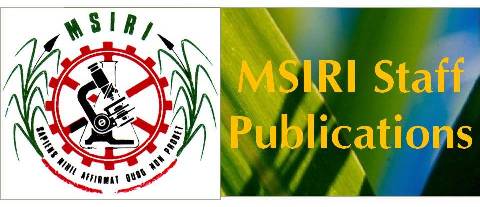Biological control of weeds in Mauritius: past successes revisited and present challenges
| MSI01P3557 | |
| Fowler, S. V. Ganeshan, S. Maureemootoo, J. Mungroo, Y. | |
| Biological control of weeds in Mauritius: past successes revisited and present challenges | |
| Spencer, N. R. (ed), Proceedings of the X international symposium on Biological control of weeds, 4-14 July 1999, Montana State University, Bozeman, Montana, USA | |
| book chapter | |
| 2000 | |
| p. 43-50 | |
| En | |
| En | |
| Ten insects species were introduced to control five weeds on the island of Mauritius from 1914 to 1982. Eight of these (80 per cent) became established. The biocontrol programs against Opuntia vulgaris, O. tuna and Cordia curassavica were completed successful, with all three target plants now not considered as weeds, and requiring no management other than the ongoing, self-sustaining biological control. Lantana camara is under partially successful biological control, giving an overall full/partial success rate of 80 per cent. No deliberately introduced insects have been reported attacking non-target plants. No weed biocontrol agents have been introduced since 1982 despite worsening eed problems, particularly in native vegetation. Two of the worst forest weeds on the main island are Chinese guava (Psidium cattleianum) and privet (Ligustrum robustum); both have recently been considered as biocontrol targets in other countries. Lantana camara is a serious weed on Rodrigues (574 km from the main island). No official attempts to introduce weed biocontrol agents onto Rodrigues have been made, although one, Uroplata girardi, is common there on Lantana camara. Despite past successes with biological weed control in Mauritius, and current invasive weed problems, it has been difficult to initiate new weed biocontrol programs. Obtaining funding for new programs is a major challenge, although some may use research conducted elsewhere and hence be relatively cheap. Prioritizing weeds as targets for biological control is important, and will depend on factors such as conflicts of interest in weed control, availability and sustainability of alternative control methods, significance of alien vertebrate disperers, and the scale of impact of the weeds in intact native vegetation or active restoration programs. | |
| Weeds biological control Insects Forest weeds Mascarene islands Opuntia vulgaris Opuntia tuna Cordia curassavica | |
| Mauritius | |
| Weeds | |
| Biological control | |
| 2001-05-03 | |
| En | |
| Lib | |
| CAT | |
| Ento |
